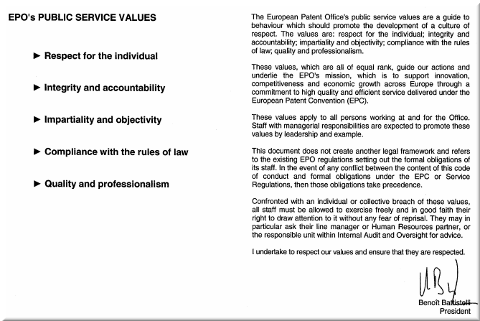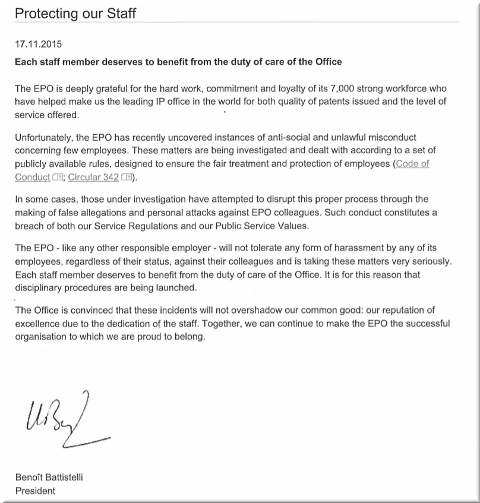04.10.16
What is Known (and Not Known) About Attacks on Croatian Portal That Exposed Željko Topić, the Notorious EPO Vice-President
People on a mission to destroy/crush and accumulate more power in the process
“I am extraordinarily patient, provided I get my own way in the end.”
–Margaret Thatcher
Summary: Dnevno.hr, a popular news site which wrote many articles about Željko Topić (a locally-disgraced official), has encountered resistance and people from Croatia tell us more about it
THE problems at the EPO exacerbated after the HR department had foolishly hired Željko Topić. Maybe it didn’t do a proper background check, maybe he wasn’t honest enough about his background, or maybe the background was known all along but viewed as compatible with Battistelli’s iron-fisted monarchy-esque regime. Either way, Mr. Topić remains inside the EPO (for now) and it does nothing but discredit the Office (and by extension the entire Organisation).
“It’s hard to tell just how widespread this campaign of silencing really was.”The interesting thing about Željko Topić and other such goons is that they too (like the EPO) tried to take the articles down from a Croatian portal. We were told this by people close to the action and we previously saw what seemed like evidence that more than this one portal was targeted. It’s hard to tell just how widespread this campaign of silencing really was. Topić repeatedly lost a defamation case about it. See for instance some of the following articles (not a complete list):
- Suspicion of High-Level Corruption at the European Patent Office (EPO): Part I
- Vesna Stilin’s Remarks on Željko Topić: Part XI
- Vesna Stilin Renews Her Fight for Justice in Željko Topić Case (EPO VP)
- Breaking: EPO Vice-President Željko Topić Loses Defamation Case in Croatia
- Text of Ruling/Decision Against Željko Topić (Regarding Audi as a Bribe)
- English Translation of Ruling Against Željko Topić (EPO VP) in Croatian Court
- German Translation of Ruling Against Željko Topić, the EPO’s Vice-President
- Željko Topić’s History in SIPO Leaves a Legacy of Alleged DZIV Vehicles (Bribes), Authorship Abuses, and Intimidation Against Reporters
- Translation of Full Judgment Against Željko Topić in Croatian Defamation Case Over Bribery (Mercedes/Audi) and More
- SLAPP-Happy EPO Vice-President Željko Topić Loses Croatian Defamation Lawsuit — AGAIN!
What we know for a fact is that Topić actively suppresses criticism (by going directly after his critics). We are not sure if he is also behind DDOS attacks, as some people allege based on suspicion but not much more.
“We are not sure if he is also behind DDOS attacks, as some people allege based on suspicion but not much more.”A month ago someone from Croatia sent us an E-mail titled “Cyberattacks to web site Dnevno.hr” — an attack (or several attacks) which we already knew about because people told us about that more than a year ago. To quote just a portion, the “news portal dnevno.hr” had a “short conversation with” this messenger, who spoke to the portal’s “owner, Mr. Michael Ljubas and editor Mr. Drazen Boros.”
“In several topics for discussion,” we got told, “in one moment we open old cyberattack to web site dnevno.hr in period Dec 2014 to Jan 2015.”
“I have had a lot of issues such as the above (DDOS) since I started writing about Topić in 2014.”Based on the message, “there is a doubt/suspicion on the company Moscow Telecom Corp (COMCOR)” and we were advised to get in touch. As a reminder to those who haven’t been following this saga long enough, Techrights too came under DDOS attacks around that time and SUEPO suffered DDOS attacks. It submitted a formal complaint to Dutch authorities shortly thereafter, but nothing has been heard about it since.
We don’t want to relay rumours as nothing other than rumours or lay the blame without hard evidence, but another source of ours with other sources in Croatia suspected, based on what s/he had heard, that it could, in theory, be related to Topić. I have had a lot of issues such as the above (DDOS) since I started writing about Topić in 2014. I am eager to find out more about the correlation, if any, hence I attempted to contact people from Dnevno.hr. That was a month ago. The DDOS attacks against Dnevno.hr are not the subject which we deem news; rather, it was the attempt to convince the site to take articles about Topić offline (effectively deleting them). This reinforces suspicions because there is definitely motivation. Here is the message I sent to Dnevno.hr (with minor redactions), in spite of the likelihood that they don’t speak English:
Dear Dražen Boroš and Michael Ljubas (whose e-mail I don’t have),
I am contacting you regarding Mr. Topić, now EPO V-P and formerly a source of many Croatian scandals (with ongoing court cases). I occasionally post translations of your reports but I also became aware of attacks on your site. I understand that you spoke to [redacted] and were going to contact me too. I am trying to ascertain the details regarding cybergagging, which I heard about from numerous sources for over a year. My site too came under attacks, and only after I started publishing stuff that relates to Mr. Topić (not sure if timing was a pure coincidence and whether it’s Mr. Topić who drew ire).
My plan is to publish a report on the matter and I need further input before doing so.
Sadly, I have not heard back, but shortly afterwards another article about Topić was published in Dnevno.hr, citing Techrights twice. It’s good to see that not only Croatian media makes it into west Europe but also articles from west Europe make it back into Croatia, generally making people better aware of injustices. We published a German translation of the latest article (still no English version). Most EPO workers understand at least German, so this translation may still be helpful. Very few can grasp Croatian (even remotely). Article about the EPO should come out in greater numbers and more should be said about Željko Topić (of SIPO and EPO). There is a lot of information already out there, but it’s usually not accessible to most Europeans, not even 1% of them (Croatia is not a large country/population). We need more articles in English, French, Spanish and German translated from Croatian. One thing that the EPO and Željko Topić’s SIPO have in common is staff suicides, but how many people even know this? There are also WIPO suicides with some commonality to be found in causes. It’s about staff which speaks truth to power or rattles the status quo a little, even if for perfectly justifiable reasons. “The staff representatives,” we recently read about EPO staff representatives, “noted [they] did not share their [EPO's] vision of priority: the “house is burning” and the head of the HR department finds no more urgent things to talk with staff representatives than about their personal rewards? The staff representatives stressed that it was a wrong priority altogether: while there is indeed a large issue of resources of the Staff Representation altogether, and the administration should focus on the fact that many officials are threatened, investigated fired or sick…”
Or having committed suicide (see the WIPO and SIPO suicides). █






















 Content is available under CC-BY-SA
Content is available under CC-BY-SA